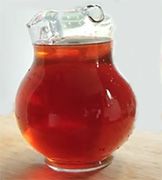- Could Artificial Sweeteners Be Aging the Brain Faster?
- Techniques for Soothing Your Nervous System
- Does the Water in Your House Smell Funny? Here’s Why
- Can a Daily Dose of Apple Cider Vinegar Actually Aid Weight Loss?
- 6 Health Beverages That Can Actually Spike Your Blood Sugar
- Treatment Options for Social Anxiety Disorder
- Understanding the Connection Between Anxiety and Depression
- How Daily Prunes Can Influence Cholesterol and Inflammation
- When to Take B12 for Better Absorption and Energy
- Epsom Salts: Health Benefits and Uses
Man’s Iced Tea Habit May Have Swamped His Kidneys


Drinking too much iced tea might be surprisingly hard on your kidneys, a new case report contends.
After conducting a kidney biopsy on a 56-year-old man with unexplained kidney failure, doctors discovered numerous oxalate crystals in his kidney tissue. Oxalate is a naturally occurring substance found in food and drinks.
Black tea is a significant source of oxalate, and the man acknowledged drinking 16 glasses of iced tea every day. The report authors suspected that his iced tea habit was the likely culprit in his kidney failure.
“There are reports about kidney stones related to high oxalate intake attributed to tea, but to our knowledge there are no reports of biopsy-proven nephropathy [kidney damage] associated with excessive consumption of iced tea,” said one of the report’s co-authors, Dr. Alejandra Mena-Gutierrez, of the University of Arkansas for Medical Sciences in Little Rock.
Still, it’s important to note that the doctors in this case could only link iced tea consumption to the man’s kidney failure. They couldn’t prove that the tea was the culprit.
The researchers reported the man’s case in the April 2 New England Journal of Medicine.
The study findings don’t surprise Dr. Ramya Malchira, an attending nephrologist at UCLA Health, Santa Clarita, and clinical instructor of nephrology and general internal medicine at the David Geffen School of Medicine at UCLA. “The most common type of kidney stones are calcium oxalates,” she said.
Although it hasn’t been proven that eating a lot of oxalate-containing foods causes kidney stones, doctors do put certain kidney stone patients on a low-oxalate diet, Malchira said. Oxalates are found in many foods and drinks, such as dark beer, black tea, instant coffee, chocolate milk, soy drinks, nut butters, high-fiber cereal, whole wheat bread, spinach, dry beans and some fruits, such as blueberries, blackberries and raspberries.
The researchers said that kidney problems caused by high oxalate levels may be an under-recognized reason for kidney failure.
In the United States, the average intake of oxalate per day ranges from about 150 to 500 milligrams, the researchers wrote. That’s higher than the recommended intake, which is under 40 or 50 mg per day, they noted.
Black tea has about 50 to 100 mg for every 100 milliliters (about 3.4 ounces), the researchers said. The man with the failing kidneys was drinking more than 1,500 mg of oxalates a day, they estimated.
So how much iced tea is potentially hazardous? Both Mena-Gutierrez and Malchira said it depends on the individual and the person’s other medical conditions and history. However, Mena-Gutierrez said that one or two cups a day would generally not be harmful in otherwise healthy people.
“Two to three glasses [a day] would be considered safe if you are not eating other oxalates,” said Malchira. However, if someone was also eating high quantities of high-oxalate foods such as spinach, “even two or three glasses could be too much,” she said.
If a normal, healthy adult was taking in about 500 milligrams a day of oxalates, the kidneys should be able to clear that amount easily, Malchira added.
More information
To learn more about a low-oxalate diet, visit University of Pittsburgh Medical Center.
Source: HealthDay
Copyright © 2026 HealthDay. All rights reserved.










